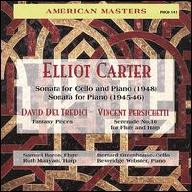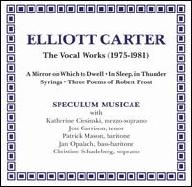In his youth, Carter's parents bought insurance from Charles Ives; young Carter went on to edit the by-then disabled composer's manuscripts. He went to high school in New York City and attended Harvard in the late 1920s, majoring in literature and languages. He also studied piano at the Longy School of Music in Cambridge, Massachusetts. In 1930 he devoted himself to music full-time. While still at Harvard, he studied counterpoint with Walter Piston and orchestration with Edward Burlingame Hill; in 1932 he attended a seminar by Gustav Holst. After receiving his M.A. that year, Carter went to Paris, where he studied with the renowned composition teacher Nadia Boulanger. During this period he also studied mathematics. In 1935 he returned to the U.S. For several years he worked in ballet and for the Office of War Information. In 1946 he finished his Piano Sonata, a piece replete with the constantly shifting time signatures and complex rhythms that became typical of his work. His music never got easier, either for the performer or the listener.
Carter also spent a great deal of time teaching as well as composing. His various pedagogical appointments included St. John's College in Annapolis, Maryland (1939-1941), the Peabody Conservatory in Baltimore (1946-1948), Columbia University (1948-1950), and Yale (1958-1962). He was also a professor-at-large at Cornell University (1967-1968). Carter received many honors for his compositions, including two Guggenheim fellowships (1945 and 1959), and the American Prix de Rome (1953). In 1960 his String Quartet No. 2 won a Pulitzer Prize. He won another Pulitzer in 1973 for his String Quartet No. 3. Then-president Ronald Reagan honored Carter with the National Medal of the Arts in 1985. Although Carter's music has never attained anything like the popularity accorded the work of a contemporary like Aaron Copland, he always received his due among critics and academics. His fellow musicians also venerated him; such younger composers as Oliver Knussen and Franco Donatoni acknowledge his influence. Elliott Carter died at his home in Greenwich Village on November 5, 2012; he was 103 years old. ~ Chris Kelsey, Rovi















